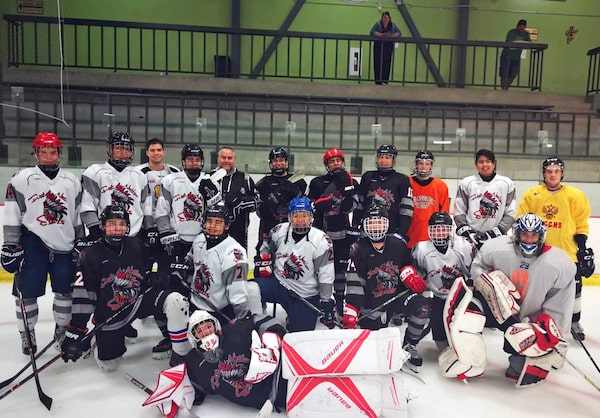
The First Nations Elites hockey team at a 2018 tournament. submitted by Tommy H.J. Neeposh In late May, the First Nations Elites, composed of players aged 13 and 14, competed in the Coupe Challenge Quebec AAA, an annual bantam tournament for local teams. The indigenous team faced racial slurs.Tommy H.J. Neeposh
An Indigenous hockey team that faced racial slurs at a recent tournament in Quebec City say that little action has been taken by tournament organizers to address the abuse.
In late May, the First Nations Elites, composed of players aged 13 and 14, competed in the Coupe Challenge Quebec AAA, an annual bantam tournament for local teams. The Elites come from several Cree, Algonquin and Atikamekw communities in Quebec, as well as First Nations communities in Ontario and Nova Scotia.
According to team coach Tommy Neeposh, as well as players and parents, the Elites were called “savages” by spectators and by an opposing coach. Another team mimicked stereotypical war cries during a warm-up, a DJ played pow wow music before the Elites got on the ice and the referees penalized the team excessively, they said.
In light of the abuse, some of which was caught on video and later posted to Facebook, Neeposh says that the tournament’s organizers have not done enough to properly address the incident.
“They’ve done nothing. Absolutely nothing,” Neeposh said. “We haven’t even received an apology from them.”
Like many other little-league tournaments in Quebec, the Coupe Challenge falls outside the jurisdiction of Hockey Québec, the governing body of hockey in the province, which has clear guidelines on racism and discrimination in its code of ethics. According to Neeposh, smaller tournaments’ policies on racism aren’t enforced to the same extent as they are at Hockey Québec.
For their part, the organizers of the tournament contend that they have a zero-tolerance discrimination policy, and that during the tournament, they reiterated to all participating teams of the Coupe Challenge that racism would not be tolerated. Jonathan Lachance, a co-organizer of the tournament, said that he met with the coach who called Neeposh’s players “savages” after the game, and that the coach promptly apologized.
But Neeposh said the coach’s apology doesn’t account for all the other incidents, and the zero-tolerance policy is not adequately enforced. “Zero tolerance? We faced [abuse] all weekend with every team and every game.”
For many parents and managers of Indigenous hockey teams, incidents such as these are unsurprising, and the organizers’ handling of the incidents are all too familiar.
“It’s like that every year, everywhere we go,” said Donald Lucas, the founder of LaFlamme hockey, a group of junior teams for Indigenous boys in Quebec. Parents yell racial slurs at his players, sometimes telling him to take his players “back home” to the reserves in Northern Quebec and Labrador where they come from. Lucas said he once had to escort his team of nine-year-old boys out the back door of an arena in Val-D’or to avoid a confrontation with an angry coach waiting for them by the front entrance.
Both Neeposh and Lucas have complained to the tournaments’ organizers in the past, but with little success. They said that most of the time the organizers assure the coaches they will work to fix the problem, but rarely follow through.
As a result, the two coaches now avoid certain tournaments they know will attract racial abuse – an approach that other Indigenous parents and coaches take as well. Jarris Gull, the assistant coach of the Cree Nation Bears, said that he was selective with where he sent his daughter to play hockey. He said the more convenient option would be to register her for the local hockey league in Amos, Que., but having played there himself as a teenager, he didn’t want her to face the same kind of “name-calling” that he faced. “I didn’t want my daughter to go through the same kinds of situations,” he said.
The experiences are especially concerning for coaches and parents of youths who play on Indigenous teams, who worry that this will deter them from getting involved with sports. Rosalin Miles, a First Nations professor of Indigenous studies and kinesiology at the University of British Columbia, said that being part of a team can be especially beneficial for players from low-income, remote communities which may experience bouts of drug addiction, and precarious living conditions. But, “if you’re being harassed and bullied, it’s going to decrease your motivation to be involved,” she added.
Publicity over the recent events is prompting calls for institutional change in junior hockey. “There should be zero-tolerance policies for harassment in sports,” Miles said. “You have legal rights not to be harassed and discriminated against, and it should apply here, too.”
Neeposh believes the tournaments would benefit from more First Nations representation on their staff who can identify on-ice racism so that it can be penalized appropriately. The lack of representation, he said, is in many ways what allows for this problem to persist.
“They don’t see our point of view. They don’t see what we face. They don’t see the racism.”